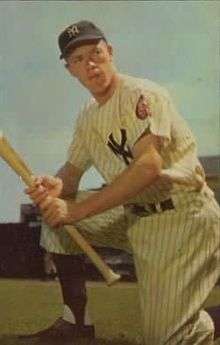Gilbert James "Gil" McDougald (May 19, 1928 – November 28, 2010) was an American Major League Baseball (MLB) infielder who spent ten major league seasons playing for the New York Yankees from 1951 through 1960.
McDougald was the 1951 American League (AL) Rookie of the Year. He was an All-Star for five seasons, and was a member of eight American League pennant-winning teams and five World Series champion teams. He was known for hitting a line drive that severely injured pitcher Herb Score's right eye during a game in 1957.
Early life
McDougald was born in San Francisco and attended the University of San Francisco.
MLB career
McDougald played his first major league game on April 20, 1951. On May 3 of that year, he tied a major league record, since broken, by batting in six runs in one inning.[1] Later in the year, in the World Series, he became the first rookie to hit a grand slam home run in the Series. He narrowly beat out Minnie Miñoso in the voting for the 1951 American League Rookie of the Year. His entire major league career was spent on the New York Yankees. He was a versatile player, playing all the infield positions except first base: 599 games at second base, 508 games at third, and 284 at shortstop. He was an All-Star in 1952, 1956, 1957, 1958, and 1959, playing in four of the six games that were played (two All-Star games were held in 1959).
McDougald led all American League infielders in double plays at three different positions – at third base (1952), at second base (1955) and shortstop (1957). He was the double play leader at shortstop despite sharing time at the position with rookie Tony Kubek.
On May 7, 1957, McDougald, batting against Herb Score of the Cleveland Indians, hit a line drive that hit Score in the right eye. It caused Score to miss the rest of the 1957 and much of the 1958 season. While addressing reporters following the contest, McDougald said, "If Herb loses the sight in his eye, I'm going to quit the game." Score regained his vision and returned to pitching in the majors late in 1958.[2] Only two years before, McDougald was struck in the left ear during batting practice by a ball hit by teammate Bob Cerv. Though initially believed to be a concussion (he missed only a few games), McDougald soon lost the hearing in his left ear and later also in his right. He retired in 1960 at only age 32, though not directly because of his hearing loss.[3]
In 1958, McDougald was given the Lou Gehrig Memorial Award, which is awarded annually by the Phi Delta Theta fraternity (to which Gehrig belonged) at Columbia University.
His last appearance was in Game Seven of the 1960 World Series against the Pittsburgh Pirates; as a pinch runner in the top of the ninth, he scored on Yogi Berra's ground ball to tie the game at 9–9. The Pirates, however, won the Series on Bill Mazeroski's walk-off home run in the bottom of the ninth.
McDougald decided to retire as an active player after the Fall Classic when it appeared that the Yankees were going to leave him unprotected for the 1960 Major League Baseball expansion draft with the strong likelihood that he was going to be selected by either the Los Angeles Angels or Washington Senators.[2]
While with the Yankees, McDougald was a resident of Tenafly, New Jersey.[4]
Personal life
McDougald was a former baseball coach at Fordham University.
His hearing loss was somewhat restored by a cochlear implant he received during a surgery at the New York University Medical Center in 1994.[5] McDougald later became a paid spokesperson for the manufacturer, Cochlear Americas, including benefits for hearing organizations and testimony before Congress.[3]
McDougald died of prostate cancer at his home in Wall Township, New Jersey, at the age of 82; He was survived by his wife, seven children, and 14 grandchildren.[6][7]
See also
References
- ↑ Clifton, Merritt. "The Ballplayers – Gil McDougald". BaseballLibrary.com. Retrieved 2009-01-28.
- 1 2 Goldstein, Richard. "Gil McDougald, Ex-Yankee, Dies at 82," The New York Times, Tuesday, November 30, 2010.
- 1 2 Reisler, Jim (September 16, 1996). "Sounds Great to Him". Sports Illustrated. Retrieved November 29, 2010.
- ↑ Drebinger, John. "Will Gil Move His Bag or Baggage?; McDougald May Go to 2d, 3d or Short or to New Team", The New York Times, March 3, 1960. Accessed October 11, 2015. "The former Californian, who now lives in Tenafly, N. J., has helped the Yankees win pennants as a star second baseman, third baseman and shortstop."
- ↑ Berkow, Ira. BASEBALL: The Sweetest Sound of All; McDougald, Yankee Star of 50's, Can Hear Again After Operation, The New York Times, January 4, 1995. Accessed July 14, 2011. "The McDougalds had taken the nearly two-hour train ride from their home in Spring Lake, N.J., and would be going across the street to Bellevue Hospital."
- ↑ Bollinger, Rhett (29 November 2010). "Yankees' McDougald, '51 ROY, dies at 82". MLB.com. Retrieved 1 December 2010.
- ↑ Goldstein, Richard. "Gil McDougald, Ex-Yankee, Dies at 82", The New York Times, November 29, 2010. Accessed October 20, 2015. "Gil McDougald, the Yankees’ versatile All-Star infielder who played on five World Series championship teams but was remembered as well for a single at-bat resulting in one of baseball's most frightening moments, died Sunday at his home in Wall Township, N.J."
External links
